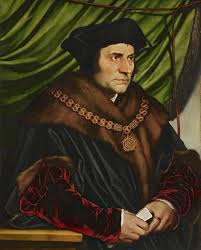I noticed that throughout Utopia, there is a confusing mix of Biblical language and language that conflicts with Christian beliefs. I found it difficult to fully understand the way More draws upon Christianity in his novel. Though More evokes Biblical language throughout Book II of Utopia, the way he constructs the Utopian culture does not always align with Christian beliefs. For example, the Utopian views on death, marriage and divorce, and the purpose of life are not Biblical. Despite these divergences (which are not insignificant), there are dominant undertones of Christianity throughout Book II.
For example, More uses Christian arguments to justify Utopian beliefs about gold and money. The speaker points out the folly of people outside Utopia who pile up money or hide gold that they will never use, explaining that, “in their anxiety to hold onto it, they actually lose it” (63). This line evokes the well-known verse from the Gospels, “whoever wants to save their life will lose it, but whoever loses their life for me will find it” (Mt. 16.25). Thus, Utopian beliefs about possessions are similar to the teachings of Jesus, which warn us not to “store up for [ourselves] treasures on earth” (Mt. 6.19). Another section of Book II that draws upon Biblical language is the discussion of Utopian values. According to the speaker, some religious people choose not to pursue any studies, but, rather, devote their lives to serving others. The speaker explains that “the more [these religious people] put themselves in the position of slaves, the more highly they are honored by everyone” (88). This line mirrors Jesus’s teaching that “those who humble themselves will be exalted” (Mt. 23.12). Here, Jesus refers to God’s response to humbling oneself in the service of others, rather than the people’s response. However, the ideas are similar in that the Utopians seem to possess a similar perspective to Jesus on the goodness of selfless service.


I think you raise a really interesting point about the novel! I definitely also noticed the confusion regarding religious thought throughout it. It’s interesting that Utopia is meant to be this ideal community, one that I interpreted as being akin to heaven on earth, but yet many of the ideas regarding it are so different from the Christian faith.
As we mention in class, I think Sir More is actually being sarcastic. Sir More is most likely trying to illustrate an Utopia where what we now know as freedom of religion is present. It’s hard to tease apart which qualities he actually wants in his ideal Utopian society. But based on Raphael’s dialogues, I believe that Sir More believes more in peace than a dogmatic religion.
Really interesting point. As readers and scholars, it’s frustrating to find so many contradictions in More’s ideology; we just want it to be simple so we can analyze it more easily. However, I think there is also a lot of valuable insight to be found in these contradictions. In particular, I believe they hint at More’s incredibly difficult relationship with Christianity. As we’ve discussed in class, the book is indeed partially a religious satire, but More is also a devout Christian. As readers, we are getting a special behind-the-scenes tour of the ideological battle raging in More’s troubled psyche. Moreover, I think More’s struggle quite accurately reflects the thoughts that many people of faith have throughout their lives: it’s very difficult to embrace every single tenet of a religion, and the challenge of faith is to continue to place more value on the tenets one agrees with rather than those they disagree with.